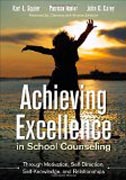
Achieving Excellence in School Counseling Through Motivation, Self-Direction, Self-Knowledge, and Relationships
Squier, Karl L.
Nailor, Patricia
Carey, John C.
Too often school counselors find themselves stuck when they try to improve students' social and emotional health, or they react to problems that present themselves rather than preventing those problems before they happen. This exciting new book by leaders in the field of school counseling provides school counselors with: Characteristics and abilities of learners that promote effective academic learning and postsecondary success Understanding of how to intentionally develop these characteristics and skills in all learners through developmental programming. The authors take a fresh new look at the relationships between school counseling standards, school counseling research, and the best research on student success. INDICE: DedicationTable of ContentsForwardAcknowledgmentsAbout the Authors1. Introduction Purpose of Book How Book Chapters are Organized Book Chapter Descriptions From Concept to Practice CBA Toolkit Components Construction Site Components Chapter 1 Construction Zone2. A Simple Language Set Importance of the Language We Use Construct Context Results Curriculum Student Assessment Program Implementation and Evaluation How the Terms in the Language Set Relate Standards and Competencies are the Foundation of the Curriculum Chapter 2 Construction Zone3. Research-Based Constructs Definition of Research-Based New Focus on Personal, Social and Life Skills Motivation Self-Knowledge and Self-Direction Relationships Conclusions Chapter 3 Construction Zone4. Relevant Contexts for K-12 School Counseling Programs From Constructs to Contexts Competency Statements Emerge from Contexts Contexts Consist of Essential Processes Academic Support Chapter 4 Construction Zone5. Student Results (Standards and Competencies) Achieving Excellence Counseling-Learning Environment (CLE) Two Types of Student Results Construct-Based Student Standards A Vision to Live By Competencies as Proficiency Builders Writing Meaningful Competency Statements A Focus on Cognitive Skill Development A Focus on Metacognitive Skill Development Role of School Counselors Chapter 5 Construction Zone6. Role of Curriculum in a CBA Where We Are in the CBA Building Process Essential Characteristics of a CBA Curriculum Principles for Learner Centered School Communities Results-Based CBA Curriculum in a Nutshell Chapter 6 Construction Zone7. Assessing Student Progress toward CBA Counseling Standards CBA Student Proficiency Assessments Assessing Current Levels of Competency Assessing Gains after Interventions Assessing Progress towards Standards at Key Transition Points Assessing Curriculum-Related Proficiencies Importance of Linking CBA to Research-Based Constructs Chapter 7 Construction Zone 8. CBA Program Implementation: Focus on Planning Shift in Focus from Building to Implementing a CBA How to Begin Why All the Fuss About Planning? Three Perspectives on the Planning Process Four Types of Plans Chapter 8 Construction Zone9. CBA Program Implementation: Focus on Program Delivery Delivering a CBA Program with Fidelity Data Management School Counseling Data Management System Chapter 9 Construction Zone10. BA Program Implementation: Focus on Evaluation Program Evaluation is an Improvement Process What Needs to be Evaluated Chapter 10 Construction Zone11. CBA’s Contribution to School Improvement Initiatives Contribution to Current Practice Contribution to Knowledge and Skill Requirements Initiatives ACT’s Five Principles CBA Contribution to School-Based Intervention Initiatives Toward a More Holistic View of Student Learning Chapter 11 Construction Zone12. Power and Potential What is Power and Potential? A Vision to Live By Summary of Key Points School Counselor AccountabilityReferences
- ISBN: 978-1-4833-0672-8
- Editorial: Corwin
- Encuadernacion: Rústica
- Páginas: 208
- Fecha Publicación: 31/07/2014
- Nº Volúmenes: 1
- Idioma:
